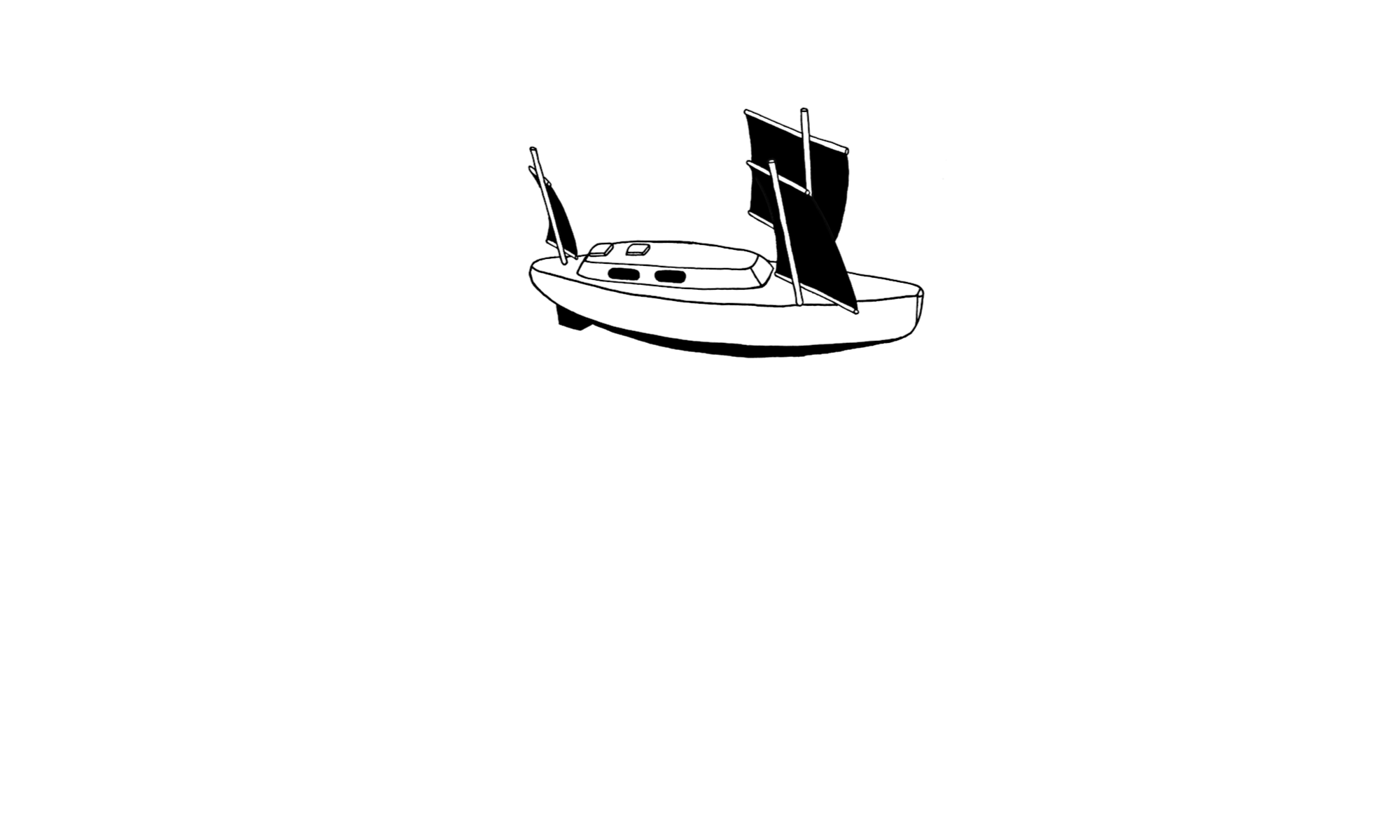Every yacht is a compromise, but to different degrees, the fewer compromises you have to make the better boat you get. Therefore it is important to have its intended use clear in mind. If not, the boat may end up like the famous Swiss Army knife, with screw-drivers, cork-screws, tweezers, awls, pens, rulers, nail-filers and countersinkers. A product that can do many things passable, but that cannot do anything well. If I have a good functional knife I do not add a cork-screw to it because I know I get an inferior knife.
In the same I do not approve of adding watermakers, fridges, gensets, and other conveniences to my boats because that will convert her to a nearly useless Swiss Army knife. I prefer to get a smaller purposeful boat and go cruising now instead of staying stuck in marinas spending my time and money servicing its machinery.
For about 60 years I have been in the searching of the good boat. 1962 was the first time I left Sweden on my own keel. I was 23 years old, contrary and stubborn, set in my ways. I had immense self-confidence. I was misfit in society, but well fitted for the cruising life. Already I had experienced more than most grown men. I understood that there must be more to life than doing routine work. I realized that hidden beyond the bourgeois rules and regulations existed a fantastic world and wanted to discover it and be part of it, but I had very little money.
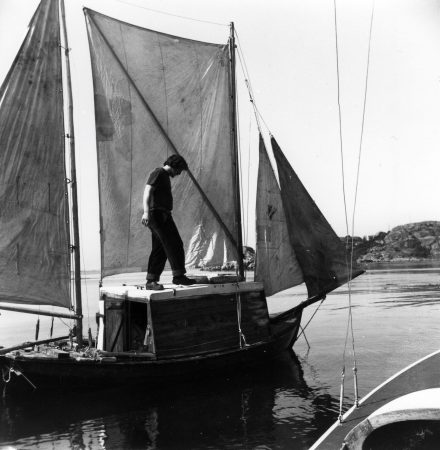
The solution was a small boat. I am sure that today there are thousands of men, young and old, and women of all ages and many others that feel the same, that also wants to explore their inner and outer worlds in a simple sustainable seaworthy boat. If you are one of them read on. This is for you.
Unfortunately, sailing magazines, more often than not, place photos of big shiny yachts on their cover pages. They try to make you believe that a yacht needs to be big, to have a deep ballast keel, and a powerful diesel engine in order to be seaworthy and stand up to the stormy seas of the oceans. That’s all wrong. Stormy seas are kind to small boats; they yield to the breakers.
To be attractive, according to the established doctrine a yacht must be confortable. That is also wrong. Comfort breed’s boredom and it makes you lazy and fat. Consequently it does not fulfill its purpose. It is just a pain that cost money and takes up your time.
My boat, back then in 1962 was 15 feet long or 4.5 meter. Its intended use was a safe shelter for my few belongings and myself, a place where I could read and reflect on the mysterious world I was living in.
In calm weather I should be able to mow her safely from place to place along the coast. In those early days harbor dues were no problems as there were so few boats about that it was not profitable to collect them.
Encouraged by how well the idea worked my ambitions grow. Continents beyond oceans tempted me. This was the time before cheap air travel. A simple boat was the solution I realized. It had however to be more seaworthy. It must to be able to handle furious storms. At the same time should not be big and complicated. It had to be cheap.
It is not more work to build a good boat than a bad one, but you have to know what you are doing.
A wise friend of mine from the time I served a prison sentence, a dangerous murderer in the cell next to me, had advised me as our ways parted.
Yrvind, he said.
Never do what I have done. Instead if you have a problem, go to the library. Books will guide you.
If you like to build a radio receiver, there is a book about that.
If you like to learn French, there is a book about that.
If you want to know how life after death is lived, there is a book about that.
And, he added: It is the smartest men that ever have existed that have written those books.
That was potent advice. Now that I wanted to cross oceans, surely there must be a book about that. I was not mistaken. In libraries I found shelves after shelves of nautical books. For many years I studied, not only boatbuilding and navigation but also mathematics, astronomy, meteorology, fluid mechanics, physiology, nutrition and much more. In fact there was no end to all the knowledge that there was. I read and read and I got wiser and wiser. At the same time I experimented with different small crafts.
Finally in 1967 I had a good boat. I named her Anna. She was a 4.25-meter (13 feet) long rowing boat that I had decked and converted into a small cruiser.
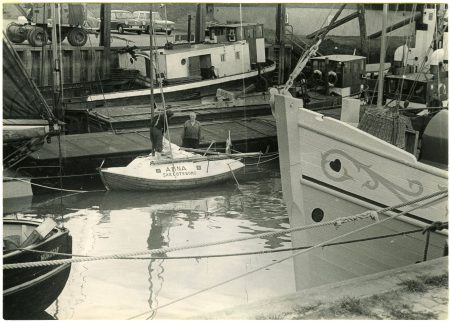
The summer of 1967 I cruised the Swedish west coast and the Danish Limfjord in North Jutland.
For a change I now also had a bit of money. I had got a job as a pedagogue working with a team of psychiatrics, psychologists and social workers to teach mathematics to children with problems. Despite the fact that I was an ex-convict and a certified psychopath I had gotten the job. The mathematics I had thought myself and my calm personality had convinced the staff of the institution that I was the man best qualified for the job. But now in 1968 I planned to sail around the world in my little 13 foot boat.
It was early May. A cold northerly wind was blowing, but I had convinced Martine, a French girl I had met at the library, she was on her way to see North Cape, that she make a detour and make me company to Kiel in Germany. After Holland and Belgium I ended up in Cowes, Isle of Wight.
Cowes is England’s sailing Mecca. There I made a beeline to the local library and found a treasury. There were shelves filled with books on yachting. A paradise.
After a while I found friends among the local yachtsmen and a place for my boat at the Folly Inn up the Medina river. The locals were amazed that I had come all the way from Sweden in my little boat. I let them believe that I was a clever man. I did not tell them that it was not more difficult to sail a mile in Sweden, Denmark, Germany and Holland than in England because they treated me well and I wanted them to continue to do just that.
Henry Ford used to say: Everything is possible; just divide the task into small enough pieces.
It had become September. Summer was mostly gone and so had most of my money. I lived mostly on blackberries. Those I found on a disused railroad track. No one but me was attracted to the ripe sweat berries. In perfect silence, in contemplative mood, in bliss I spent hours by myself in the prickly shrubs. The weather was nice to.
My next leg on the way to the continents beyond the ocean was the mighty Atlantic. In doubt I hesitated. Was my small boat really up to it? Was I a better judge of the mighty sea than all the grown ups that warned me. I had been in over 50 harbors. I had spoken to hundreds of yachtsmen, all more experienced than me.
You must have a bigger boat, they all had advised.
A bigger boat is much safer, it is faster. Besides that it will also attract more beautiful women. In short a bigger boat would make me more happy. They all agreed about that.
The one that takes guidance is wise, while the foolish think his own way is the best.
With some doubt, because I was very content with little Anna who over the years had been so loyal, had given me so little trouble.
I sold Anna in Cowes to a lighthouse keeper. I visited Martine in Paris; she was back from North Cape. Then purposeful I went back to Sweden.
My intention was, like Slocum, to find an old wreck and convert her into a cruiser.
To get money I sold most of my cameras and lenses. I found and the hull of an old steam launch built of riveted iron plates in 1885. She had had an eventful life. During the war she had caught fire and sunk up in Munksjön Jönköping.
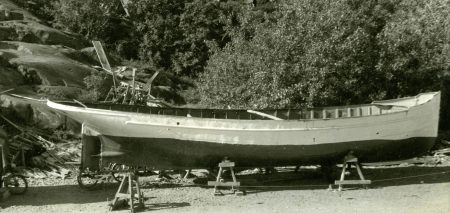
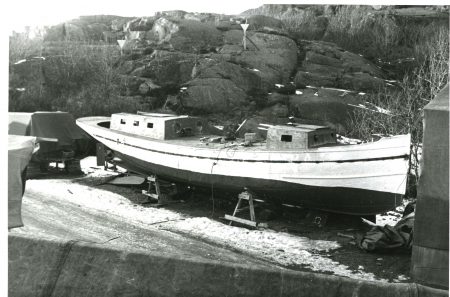
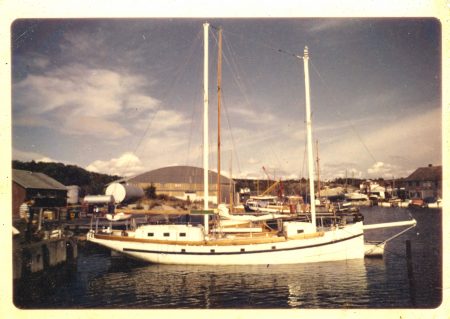
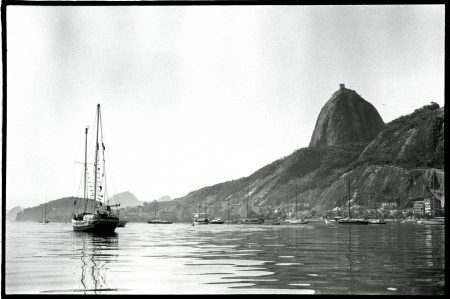
A truck driver bought the wreck. He had found her on the shore with a tree growing through her hull plate. He had transported her to Göteborg. His intention was to convert her to a motor yacht. Considering all she had been through she was mostly in good condition. Iron rusts less than steel. But there were many things to fix before the conversion could start. Now it was November and he had not even started. It had been raining after that northerly winds had brought cold weather. The water that had collected in her bilges had frozen. He was discouraged.
I had been touring the boatyards for some time. I had seen her before, but 40 feet long she was much too big for me. Then one Sunday there was a man in her, covering her for the winter.
Nice shape I said as an introduction.
You can have her for 2000 kroner (about 200 Euro or Dollar) he said. It was the biggest wreck I had set my eyes on, but it was also by far the cheapest, for good reasons. She needed a lots and lots of work. But I had done a bit of welding before and I know were the scrapyards were. In my mind, nicely painted the rusty wreck grow into a beautiful schooner that sailed the trade winds in the South Seas with me as a Captain and a beautiful girl crew. I had the money from the sold cameras in my pocket and gave it to Johnny. He took them, but then suddenly he changed his mind, but it was to late, she was already mine.
Of course 40 feet Duga, as I named her, was immense. This is 50 years ago and boats those days were much smaller. With the help of a friend I worked hard the whole winter and spring. As time passed she kind of shrunk in size.
In August, after eight months of intense work, we launched her. We were anxious to get away from Sweden before winter so in a northerly gale we departed Göteborg and headed for Kiel Germany. We docked after 30 hoers.
My advisers had been right. A big boat is faster than a small and Duga was very fast. Anna had used a month to get Martine and me to the same destination.
On the other hand, with Anna we had had a wonderful time in Denmark. Duga showed us nothing of Denmark. After having crossed the Bay of Biscay in October I found myself in Las Palmas, Canary Islands.
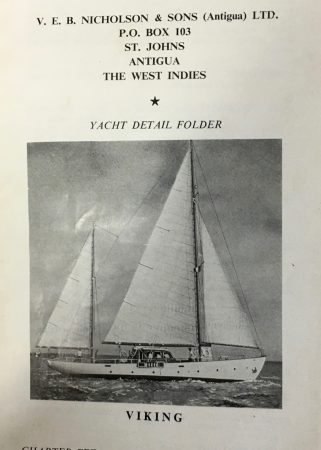
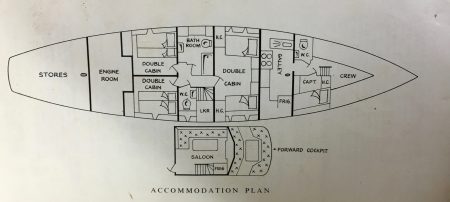
One day a big Camper and Nicholson Ketch dropped her anchor next to Duga. She flew a Norwegian flag. It was father and son, his wife and baby. They were on their way to the Caribbean. They had been there before in a Colin Archer doing charter. From one of their wealthy American customers they had borrowed money and bought the boat in Italy.
They know the trade and wanted the boat to be shiny. My friend and I were asked to do the masts. First they had to be scraped, then varnished seven times, a big job that would take plenty of time. As a bonus we where invited to have all our meals onboard. After a few weeks on board the huge ketch, from morning to evening, I found her size to be just right. In the evening after the days work was done it felt embarrassing and unfair that we had to row back to the much smaller Duga.
In not much more than a year my appetite had grown from a 13 foot boat to a 72 feet one. It was a very sobering lesson.
Those that adapt survive. This is true for all living things. Coming from the sunshine into a cave you are blind, but after a few minutes your eyes have adapted and you can orient yourself.
Three years ago I started to eat once a day. My body thought I was crazy. It protested. After a year she had adapted. Now she never gets hungry except just before lunch every day, the regular eating time. It saves me time and money and keeps me more healthy and fit. And my body thanks me and tells me that it is the best thing I have done.
Epicurus pointed out that the expense of an extravagant lifestyle outweighs the pleasure of partaking in it. He therefore concluded that what is necessary for happiness, bodily comfort, and life itself should be maintained at minimal cost, while all things beyond what is necessary for these should either be tempered by moderation or completely avoided. Wise men of all times have favored the simple life unfortunately economists do not agree.
That said the size of a cruiser depends on its intended use. Day sailing and circumnavigation calls for different sizes and size is best measured in displacement. An Olympic single scull is 8.2 meter long. It weighs 14 kilos. An Allegro, a Swedish cruiser is 8.03 meter long. It weighs 3400 kilos.
My friend jumped ship in Las Palmas. With a girl crew I sailed Duga to Rio in Brazil. Did 40 feet bring more happiness than 13 feet? No, but 13 feet Anna would have had problems carrying food and provisions for a long ocean crossing.
I sold Duga and in 1971 I was back in Sweden. A bigger boat had not made me more happy.
Adapting from a big boat to a smaller was a smart thing to do I realized. Small boats, small problems. Big boats, big problems.
I started to build Bris as I named her in my mother’s basement. The drawing of my self designed boat showed a 20 feet light displacement cruiser. I think her empty displacement must have been something like 800 kilos. It was a happy boat and I made many ocean crossings in her with and without a girl crew. Last time was in 1983 when I delivered her from Göteborg Sweden to Museum of Yachting in Newport R.I.
The present Exlex is 5.8 meter (19 feet) but her beam is only 1.22 meter compared to 1.72 meter for Bris and weighs 600 kilos empty. Exlex is those much smaller than Bris. Where I will sail Exlex depends on Corona. The next few months will tell.
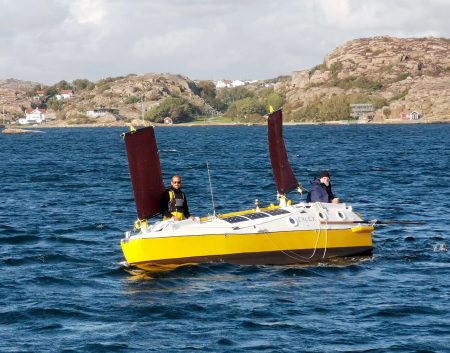
I am already thinking of my next boat. Her design gets better every day. At present she is, 7.8 meter long (25 -26 feet) with a beam of 1.3 meter. Six beams long, no measurement rule. I think she will come out with an empty displacement of about 800 depending of how heavy I build her. I like to have a boat that I can spend longer spend up to a whole year at sea without resupply, hopefully with a nice girl crew.
Why do people want boats bigger than that? Conspicuous consumption maybe? One thing is sure; the boating industry combined with yachting magazines does its best to sell us boats more expensive than we can afford. Also most, but luckily not all women go for the guy with a bigger boat.
My advice for what it is worth is. Adapt to the smallest and simplest boat that will meet the needs of its intended use. The cost of a smaller boat is a fraction of the big one. Its upkeep is a fraction of the big one and sustainability is many times greater.
Most people, but sadly not all care about our planet, they just need to be educated. Please educate yourself so that you can become one of the good ones.
Why do I like to spend so long time at sea? Of all the animals in the world only humans are bored. A bird on a twig is happy, not even the snail that travels so enormously slowly is bored.
Also you can find inner peace but it takes time to find the calm. A week at sea is usually needed just for the body to adept, a month for the soul. After that time stops to exist and you are in bliss. It is a bit like when you were very young you literally “lived in time”. You had no awareness of its passing. It is a pleasing experience. You cannot be bored.
The old man complains you say. Yes it was better before, or it might be worse now. The fact is our world has grown less and less safe.
Younger persons do not realize this because they nothing to compare with. They have not experienced that world that existed before they were born. They have grown up with cellphones and TV.
Already Thoreau in the 1850 complained of modernity.
Jean-Jacques Rousseau in the 1750 pleaded back to nature.
Some philosophers maintains that the agriculture revolution that happend 10,000 years ago when there was maybe only one million inhabitants on earth was humanity’s worst catastrophe.
When I was a child the world population was about 2 billion now it is close to 8 billion. Our finite world now have to feed four times as many inhabitants, inhabitants that per capita now consumes many times as much as the persons that lived the old kind of life. Clearly the food is less ecological and nutritious. This has been said many times before, but we have not acted on it therefore I again bore you with the facts. I think that they need to be repeatedd once more.
When I started to cruise there were no marinas and no harbor dues. When I arrived and I just dropped my anchor.
With increasing population and communication crime have increased at an alarming rate. Big populations favors crime. Nowadays many places are not safe.
1845 Henry Thoreau borrowed an ax and walked down to Walden pound. There he cut down some trees and built himself a 10X15 feet cabin. In the cabin he lived a simple life for a year or two.
A hundred years later, 1944 Harlan Hubbard and his wife could still build a shantyboat in the old fashioned way. Thiers had a 10X15 feet cabin, same size as Thoreaus. They built it on the shore of the Ohio River. When it was completed they slowly drifted down the river. In the summers they tied up some nice place on the riverbank and grove a garden. They lived a simple life. Eating mostly what they themselves produced. This was repeated each year for seven years until 1951 when they reached the New Orleans delta.
Today, in most places, this is neither permitted nor safe. There is however one exception. It is the mighty oceans. They cover 71% of the earth’s surface. There is no law that will prevent you to drift far out into the immense ocean in a small craft and live there in peace. You can stay there until you run out of food.
The Sargasso Sea is one such place. If you sail there in a small boat it is a wonderful place, because a small boat if rightly conceived will neither roll, nor will it flap its sails. It’s all peace.
It’s the only ocean in the world without shores, its bounded on the west by the Gulf Stream, on the north by the North Atlantic Current, on the east by the Canary Current, and on the south by the North Atlantic Equatorial Current. It has an area that is more than 12 times as large as Sweden and Sweden with an area of 410 000 square kilometer is a large country. The Sargasso Sea has no known human inhabitants. Sweden has 10 million inhabitants and is sparsely inhabited.
The Sargasso Sea water has a distinctive deep blue color and an exceptional clarity. Its underwater visibility is up to 60 m (200 feet). The average depth is 5000 meter and that suits me fine. It is situated below the Acores high pressure system so there is nearly always good weather, except for the occasional hurricane, but that’s nothing that’s worries my sturdy small boats.
The swimming season in Sargasso Sea lasts from January to December, twelve months per year! During those months, Sargasso Sea water temperature does not drop below 68°F/20°C and therefore suitable for comfortable swimming. The average water temperature in Sargasso Sea in winter reaches 72°F/22°C, in spring 72°F/22°C, in summer the average temperature rises to 81°F/27°C, and in autumn it is 81°F/27°C.
I have 10,000 books and the complete Wikipedia in 6 languages stored on my tablets. Fact-finding will be no problem. Solar panels will supply all the needed electricity pollution free and noiseless.
The Sargasso Sea is a good place to hide in in these times of troubles, Corona and other.
In August 1665 Isaac Newton avoided the Great Plague by moving to his mother. Cambridge University was temporarily closed. One day as he, in a contemplative mood, sat in her garden, he heard an apple fall to the ground. He asked himself. “Do the apple and the moon obey the same laws?” That was how he started to figure out the law of gravitation.
Drifting in the Sargasso Sea the risk of me being hit in the head by a falling apple is pretty slim. Still out there, there might be other phenomena that will inspire me to come up with worthwhile ideas that I can incooperate into my next boat as part of my pursuit of simple, sustainable living.
Also. I am an independent reshercher. Not supported by governments or other institutions. Do you like my results. Please support me. On Wendsday 22 April I have my 81 birthday.
Regards Yrvind
